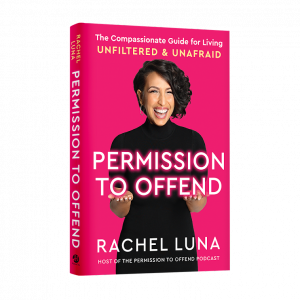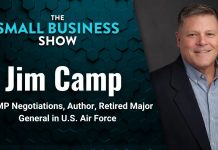Welcome to another episode of The Female Founder with Bridget Fitzpatrick, Co-founder of ASBN and the CBT Automotive Network. The Female Founder is a show all about helping women grow their businesses and reach their full potential. Each episode will highlight inspiring stories and advice from female entrepreneurs to help you build and grow your business. This show is designed to inspire and motivate other female founders to be the best entrepreneurs they can be.
Today’s guest is an amazing female entrepreneur who works every day helping others find the clarity and confidence that they need to step into their full purpose and do those big things they were meant to do. She’s a certified master coach, international speaker, Forbes-rated top 11 inspiring female entrepreneurs, book author, former Marine and so much more. We’re pleased to welcome Rachel Luna.


Transcription:
Bridget Fitzpatrick:
Rachel, thank you so much for joining us today.
Rachel Luna:
Thank you so much for having me. I am so excited to be here today.
Bridget Fitzpatrick:
Yes. We’ve got a lot to talk about, so I’m going to jump right in here if that’s okay. From being a triple-negative breast cancer survivor to losing your parents at a young age, you’ve overcome so much in your life, and to see you crushing it like you are today is so inspiring. Because you’ve been through so much dealing with just one of these things could have knocked you down for good. What has kept you going when so many may have given up?
Rachel Luna:
My faith, honestly. People ask me this question all the time and they’ll say like, “Oh, well, you’re Girl Confident on social media. Was it your confidence?” And no, the confidence is a byproduct of my faith and this innate knowing and belief that there must be a reason. And that’s really difficult, especially when you don’t find a reason or when the reasons don’t make sense. If I can give you a personal example, as you mentioned, I am a triple negative breast cancer survivor. And I met a woman on my journey who, man, she had faith like I’ve never seen. And she had this deep belief that she was going to be healed and everything was going to be great, and she died. And when she died I could not understand. I was devastated. And I remember sitting in my car crying, and I’m a God girl, so I’m crying to God and saying, “But why?”
And I just felt this wave wash over me. I said, “I don’t understand.” And then it just came to me, I understand that I will never understand why this happened. And that gave me peace of there are going to be things in life that we cannot explain. People will say it’s God’s will. I don’t believe that. I don’t believe will that we’re here to suffer. I think that our choices and other people’s choices that we have no control over impact our life. And the only thing that helps you move forward is will you have faith to believe that you’re not done? God’s not done with you yet. And so for me, every time there was a challenge, even I remember one time, I don’t know if you mentioned this, but I am a recovering alcoholic and I’ve been sober for decades. You could put all the alcohol in front of me today and I want nothing to do with it.
Bridget Fitzpatrick:
Oh, congratulations.
Rachel Luna:
Thank you. But on one day there I was hungover, scooping up my own vomit, throwing it into a toilet bowl. Was a very rock bottom moment. And I had this innate knowing like, no, no, no, no. I am supposed to be more than this. I’m supposed to be doing more than this. So can I just have faith for the day? And that is what has gotten me through all of it.
Bridget Fitzpatrick:
That is so inspiring. I like that you said it’s okay to maybe not understand why something’s happening. As women and a lot of people so much overthink and just try to figure it out when it might be better just to move on. For those women watching that might be dealing with something holding them back, what advice would you have for them?
Rachel Luna:
Okay. So first of all, I would actually challenge anyone listening to not stay into the belief that there’s something holding you back, because really there’s nothing. You’re not limited by your location, by your circumstance or situation. That is a story that we tell ourselves. And I know that there’s going to be someone listening and getting really angry at me because I said it’s a story you’re telling yourself. And they will argue with me back and say, “No, it’s not a story. The truth is, I am stuck in this city that I don’t want to live in. I’m stuck in this job, because if I quit” … And those are valid reasons. And I also, I want to remind you, you’re not stuck. Everything we have is a choice. Any place that we are in is a choice. And so you can actually choose a different reality, it just means that … No, it doesn’t mean anything other than what you make it mean.
But there is a possibility that you will have to get uncomfortable. And one of the reasons why so many people feel that they are stuck is because they don’t want to venture out into the discomfort. They’ve gotten so comfortable in a very uncomfortable situation, that what happens, I don’t know if you know this about me either, but I’m a certified master coach with a concentration in neuroscience. So let me tell you what’s happening in the brain. As soon as we attempt to do anything outside of what we’ve normally done, the brain is thinking, uh oh, we’re going to die. We’re doing something different. We don’t know what’s going to happen on the other side of this action, even if the behavior is good for you. This is why people struggle to get to the gym on Mondays. This is why people sabotage. As soon as things are going well, all of a sudden there’s a setback. And it’s like, why do these things always happen?
It’s because your brain sent out a five-fire alarm to say, whoa, if we continue on this path, we might die. Or, oh my gosh, this is painful. When people are putting themselves out there to take risk and they experience rejection, the brain center that registers rejection is the same receptor that registers physical pain. So when we get rejected, our brain is like, ah, we’re being attacked. We’re being beaten down. And so it’s really important to recognize that you are not stuck, there are just some choices that you get to make and some of those choices might cause you to be very uncomfortable. Are you willing to be uncomfortable? Are you willing to go through that pain in order to get to the pleasure that you’re waiting for on the other side?
Bridget Fitzpatrick:
And you have to be willing to do those things to be an entrepreneur, whether you’re a man or a woman, right?
Rachel Luna:
Absolutely. I think if you want to be an entrepreneur, you need to have a high tolerance for risk. You have to have a high tolerance for offense. You have to have a high tolerance for rejection and failure. And you should be okay. And I actually now get excited like, oh, we failed. Great. We’ve got feedback. Let’s figure it out.
Bridget Fitzpatrick:
Yeah. Great way to look at it. And along those lines, a lot of women in business struggle with confidence in finding the courage to speak up for themselves or ask for something that they want for fear of offending someone. Now what would you say to those women?
Rachel Luna:
You’re my favorite. I love you the most because I understand. In fact, I was traveling last week to Arizona to speak at a conference. And as I was making my way home, as we’ve already covered, I’m a triple negative breast cancer survivor, so I’m in that category of immunocompromised. So I get to the front counter, and the woman, bless her heart, is sneezing, and then she does one of these things and she’s like digging in her nose. And she says, “Can I see your ID?” So I try really diplomatic and I hold up my ID, and she’s like, “I need to touch it.” And I had this moment of, I don’t want you to touch my ID with your boogies.And so I said to her, “I would love to hand it to you. Would you mind using some of the hand sanitizer first?” And she goes, “I wash my hands all the time.” I said, “I completely understand. I believe you. I’m immunocompromised. It’s just my process. I’m happy to hand it to you once you use the hand sanitizer.” And she said, “Oh, I understand.”
And she used the hand sanitizer and it was fine. But I was honestly nervous for a moment that she would be offended, that she would get pissed off at me, that it would turn into this very big thing in a public environment. So the reason I used that story as an example is because this is a great, I call it offending in the wild. This is a great moment of offending in the wild. And what I encourage people who feel that they are not taking action for fear of offending other people is to ask themselves these questions. If I do not speak up, am I betraying myself? If I don’t speak up, am I compromising my beliefs, my values, my goals and my dreams?
Because if the answer is yes, then you have to speak up. You have to be willing to offend. And most people are not afraid of offending, they’re afraid of what’s going to happen on the other side of offense. They’re afraid of judgment, rejection, and or defamation. So judgment, what are they going to think of me? Rejection, are they going to cut me off from the community? Defamation, who are they going to tell and what are they going to say about me? And all of this signals to the brain, we are going to be cut off from the community. And remember, we still have that primitive reptile brain that kind of runs a lot of the show. And that primitive part of our brain reminds us back in the caveman days, if you got cut off from your community, you were also cut off from the food source. And if you were cut off from the food source, you died. The brain is just always trying to keep you alive. And if you can remind yourself offending someone most often does not result in someone dying, and you are going to be okay.
Bridget Fitzpatrick:
I’m going to take that advice myself. I love it. Now this brings me to your book, Permission to Offend. I’d love to talk about this. It’s available for pre-order. So what are some of the takeaways that you want your readers to take away from the book?
Rachel Luna:
Oh my gosh. Okay. This is a loaded question, because-
Bridget Fitzpatrick:
I know, there’s so much.
Rachel Luna:
Yeah, there is so much. And I will say I wrote the book, but it’s also something that I still practice. So that example of me being in the airport, I really was nervous to offend her, but I understood that to not offend her would put my health at risk. And so I had to be willing to risk my reputation. I had to be willing to risk being cut off, being hashtag canceled. And you have to recognize that very rare does someone get permanently canceled. It’s almost never happened. Even the people that get canceled, they sit out, they cool off for a couple of years and then everyone forgives them because they have—
So there are a couple of things that I love talking about. One of them is the offense capacity quotients. And I actually have a quiz that you can take to see where your offense capacity falls. Here’s my theory. If you have a high tolerance for being offended by other people, you are more likely to walk in your truth. You’re not as concerned about offending other people, because you know that deep down you’re not intentionally offending them, you’re just walking in your truth. And how people metabolize or perceive your truth is not really your primary concern. It should not be your primary concern. Now, I also talk about damage control in the book. So what happens if you are out here living your truth, and then, ugh, mother, brother, sister, cousin, uncle, best friend, neighbor, stranger is offended? These strategies to overcome that. And listen, my mom that raised me, no one has taught me more about damage control and offending than that woman, because I have offended her year after year with my way of being. But we are still thick as thieves.
There’s also something that I teach in here called the empathetic offender framework. So I break down the four offender identities that you have had to wear at some point in your life in order to survive and to be accepted by the community. So they are the pleaser, the critic, the wounded and the empathetic. Now, I know we don’t have time to get into everyone, but let’s talk about my favorite, and that is the wounded offender. The wounded offender is constantly operating in high faith, means they are bold. They will go out there and say all the things, but they are walking in low truth, low personal truth. So they have been marginalized. They have been people that have experienced big-time trauma, big-time offense, big-time hurt. And because of that, they have this armor. So you don’t ever get to know the real them. You never get to really hear their truth. You only get to see the part of them that they are letting you see so that they can survive the moment. I know we are in Atlanta. Have you ever watched the Real Housewives of Atlanta?
Bridget Fitzpatrick:
Oh yeah. I watch them all.
Rachel Luna:
I watch them all too. Kenya Moore is the classic wounded offender.
Bridget Fitzpatrick:
Oh, yeah. I can see that.
Rachel Luna:
Because you see her, you’ll see moments where she is very compassionate, very empathetic, super, super nurturing. But the minute someone says one thing that she disagrees with, she is quick onto the fence, she pulls an attack, she cuts you off at the knees and she has no room or capacity for what anyone else is saying.
Bridget Fitzpatrick:
I have a sister just like that. Yeah… Yeah, we’ll get her the book.
Rachel Luna:
Because I talk about how to navigate through each of those identities. And the one that we really want to lean into and become is the empathetic offender. Now the nice thing about the offender framework, the offender identity framework, is that every day we are vacillating through the quadrants. The goal is not to never be the critic, the pleaser, or the wounded. The goal is to recognize when you are operating in that identity so that you can use the tools that I give you, to move out of that and be more empathetic. And the reason we want to be empathetic offenders is so that we have greater community connection and the manifestation of our desires, the things that we really want, not the things that other people have told us we should want.
Bridget Fitzpatrick:
Yeah. Yeah. And as we’re working on these things, they don’t happen overnight. So it’s a practice. It’s a really every day working on becoming the person that you want to be. And I think you probably talk about that in the book too.
Rachel Luna:
I do talk about that. And it’s not so much as becoming the person you want to be, it’s recognizing who you always were deep down before your caregivers, your teachers, your clergy people told you what you should think and how you should believe. And so this is really more about a returning to home, a returning to the part of you that you’ve lost along the way through your roles and responsibilities.
Bridget Fitzpatrick:
I like that. Yeah. You really help people understand why they are who they are.
Rachel Luna:
Yes. Yes.
Bridget Fitzpatrick:
Now you are offering advice to entrepreneurs every day. If you could choose one piece of advice to tell your younger self when you were just starting out, what would you say?
Rachel Luna:
Oh, God. A couple of things. The first thing I would say is take more imperfect action. It doesn’t really matter. The fonts do not matter. The graphics are not as important as you think they are. Really what matters most is to figure out who you want to help and add value to those people every single day. Because if you add value to other people’s lives, you become irreplaceable. You become indispensable.
Bridget Fitzpatrick:
That is great advice. I love that. So now I have a morning routine that starts early in the morning with coffee, some quiet time to myself and working out. I know you journal every morning and recommend it to the people that you work with. Can you talk to us about the importance of this, as well as the importance of a morning routine?
Rachel Luna:
Yeah. Okay. Well, I have a lovely morning routine also. And I actually teach the full framework of journaling in permission to offend, well, because it’s such an important part of the equation. So I teach journaling in three simple steps, write, shift, script. So the first thing that you’re going to do is you’re going to write whatever is on your mind. The reason is because your unconscious subconscious mind houses all of your random thoughts and ideas, and your thoughts and ideas are like little children. If you do not give them attention, they will continue. It’s like the little kid that’s like, “Mommy, mom, mommy, mommy.” And then you’re like, “What?” And it’s like, “I love you. Can I have a cookie?” “Yes.” And then it runs away and it gets the cookie.
So your thoughts and ideas need to know that they’ve been acknowledged. Once you acknowledge them, they, shh, silence. They go away temporarily. Not often do they go away permanently. But what’s happening is that your unconscious mind is actually running the show. We think our conscious mind is in charge, because consciously we know, I’m going to do this, I should do that. But no, your unconscious mind is what’s really controlling your conscious mind’s behavior. And so we want to give these unconscious thoughts an opportunity to cross the conscious-unconscious barrier and come into awareness so you can process them. The second part, once you’ve written down all your thoughts and you feel kind of complete with that, you are going to shift into a state of gratitude and expectation. So this—like you saying, “I’m so excited. Now that I’ve cleared out my mind, I am ready to take the day by storm. I am ready to be who I was always meant to be. I am ready to have my business go to the next level.”
Whatever. Whatever you’re looking forward forward to, whatever you’re grateful for, this is the time and the space to write it, because when you are engaged in gratitude and expectation, it raises your frequency. When you have a high vibration, high energy, high excitement, you’re more likely to take efficient action, not just action, efficient, inspired action. And then the third step is to script. And in this phase, you are going to script your desired outcome as if it’s already happened. So if I’m talking to an entrepreneur and she says, “I want to have a six figure launch.” So now you’re going to say something like, “we did it. I had a six figure launch. Every day I showed up. I was doing my posts on social media. I was writing my emails. I invited affiliate partners. And we did the thing. And we welcomed X amount of people. And now there’s X amount of dollars in my bank account.”
The reason I tell people to script and write it as if it’s already happened is because now your reticular activating system is going to look around and see, well, did we take that action? No, we didn’t take the action. The ego doesn’t want to be a liar. It doesn’t want you to be a liar. So now you’ll start to get these ideas and prompts. Here’s the other reason why I tell my clients to be very descriptive. Try to get into as much detail as possible. What were you wearing? What did it smell like? How did you feel? Really activate those feelings, because when the client then comes back to me and says, “I don’t know where to begin.” I say, “Go look at your script. What did you say you did?” And it’s right there. All the things that you know should do, all the things that your unconscious subconscious mind actually wants you to do. It’s like you’ve written out your own roadmap for success.
And when it’s your own roadmap, you’re more likely to follow it than when you listen to a coach, or a guru, or a mentor tell you this is the framework. Why? Because the ego wants to be the one that discovers the things. This is why people will hire coaches and say, “Just tell me what to do and I’ll do everything.” And they don’t do it because it doesn’t come from within.
Bridget Fitzpatrick:
Yeah. Totally.
Rachel Luna:
So that’s the cliff notes.
Bridget Fitzpatrick:
I love that. Now, and so you’re manifesting in a way. When you’re doing that, I can imagine along the way you’re feeling good too, when you’re writing these things down that you’re manifesting that you want to see happen. And you talked about what you were going to be wearing, the smells you were smelling. Just writing those things down and feeling it would make me feel in a better mood and feel more productive or motivated to get going.
Rachel Luna:
Yeah. And actually though, I would be remiss if I didn’t mention this, for some people, writing that down, it’s going to feel very scary. In fact, it’s going to be so scary that they’re not going to be able to finish the script. They’ll maybe get one or two sentences. When that happens, I always say get curious, because your curiosity is going to lead to your clarity. So you go back to the first step, which is to write whatever’s coming up. So you might ask yourself a question. Why can’t I write this down? What am I afraid of? What am I making this mean? So I teach it write, shift, script, three steps as if it were linear. But it really is a cyclical process and you can vacillate through the steps at any time.
Bridget Fitzpatrick:
Okay, great. Thanks for clarifying that. Now, with all the exciting things that you have going on and so much to do, so what do you do when you find yourself feeling overwhelmed?
Rachel Luna:
I cry.
Bridget Fitzpatrick:
And that’s okay.
Rachel Luna:
I cry. Yeah. Actually, so one of my morning routine things is I do coffee at almost every morning for detoxification purposes. It has a lot of good anti-cancer fighting properties. But when I was in the hospital healing from cancer, I remember that one of my doctors came in. I was crying uncontrollably. I couldn’t understand why. And he said to my husband, “Just let her cry. The more she cries, the more she’s going to detox. Once she gets it all out of her system, she’s going to feel better.” And so when I am overwhelmed, I know, oh, I need to cry. I need to detox. I need to move my body.
I have to change my state, because sitting in overwhelm does not make overwhelm go away. The only way overwhelm goes away is if you take a different action. So I cry. I journal. I go for a walk. And I ask for help. If you’re going to be an entrepreneur, and a successful entrepreneur, at some point you have to stop being the worker bee and you have to start being the CEO. And a CEO knows when to delegate and when to say, my hand is in too many pots. I’m doing too many things. You all need to come in and take this over.
Bridget Fitzpatrick:
Yeah. Yeah. And that kind of brings me into my next question. I read something that you wrote, and it resonated because I think women have a tendency to try to be everything and do everything. And you said, “Once we stop trying to be everything to everyone, we get closer to our calling and our peace.” Can you talk to us about the importance of this?
Rachel Luna:
Yeah. Yeah. I mean, I think it’s so unrealistic. Let’s take that word. I just think it’s silly to expect that any one person could be everything to everyone, to do it all. And it really creates this expectation, this damaging expectation for other little girls. So I think that where we are right now, in particular women, men, you might be experiencing this as well, so I’m not going to take anything away from you, but for women, we have such a great opportunity right now to be the example. And we don’t realize that whether we choose to be the example or not, we are. I think it’s really important that we identify what roles and responsibilities do I desire to take on? What roles and responsibilities, I don’t want to take them on, but because I’ve made decisions in the past, they are mine now? I’m talking to the moms out there.
I’m a mom. Listen, this commute that I have in the mornings and the afternoons to take two kids to two different schools on opposite side of town, I don’t want that responsibility, but I made a choice to have these children. And so that’s part of the deal. But once you identify what you want to be responsible for, what role you want to take on and which ones, whether you want them or not, they’re yours, then everything else should be delegated or only taken on if you truly desire to overextend yourself. And sometimes we do. If my mom called me right now and was like, “Listen, I know you’re busy, but I need you to come to New York and help me.” It would overextend me, but I’m going to do that because I want to be there for her.
Bridget Fitzpatrick:
Right. Yeah. That’s important, for sure. Well, such great advice. Rachel, thank you so much for taking the time to talk to us today. I know your story and advice will help inspire so many. So thank you so much.
Rachel Luna:
Thank you so much for having me. This was amazing.
Bridget Fitzpatrick:
Now, for those of you who want to hear more from Rachel, be sure to check out her podcast, Permission to Offend, wherever you listen. And be sure to pre-order her book as I did. I can’t wait to read it.







